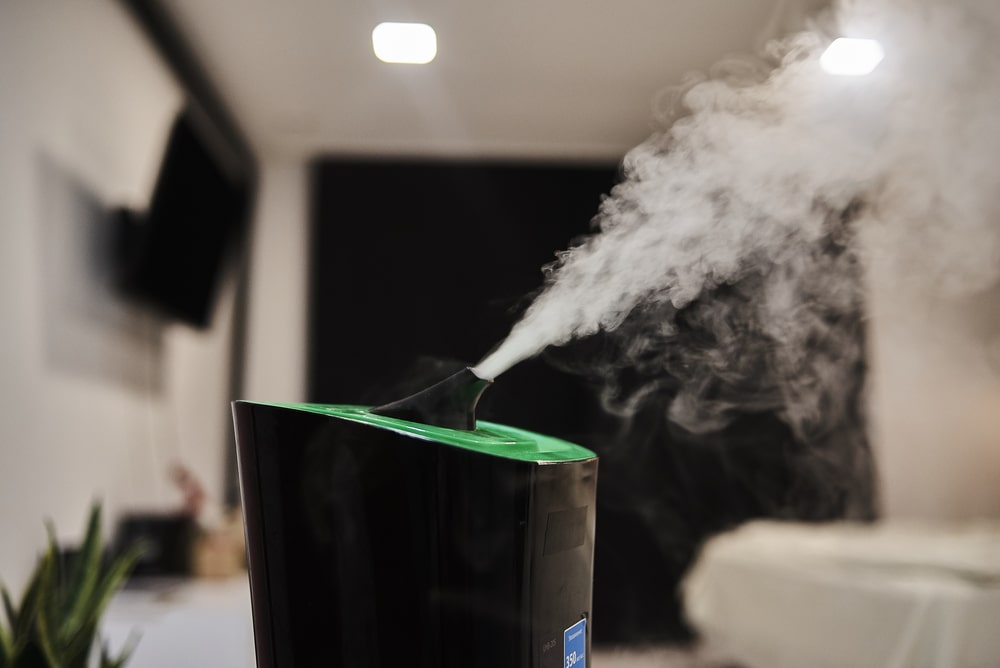Can a Humidifier Set off a Smoke Alarm
Yes, a humidifier can set off a smoke alarm due to the release of moisture particles that can be mistaken for smoke. Humidifiers are commonly used to add moisture to the air, especially in dry climates or during winter months when indoor humidity levels can drop significantly.
However, it’s important to note that certain types of humidifiers, such as ultrasonic or warm mist humidifiers, can produce a visible mist or vapor that may trigger a smoke detector. This is because the particles released by the humidifier can be detected by the smoke alarm’s sensors, which are designed to pick up on airborne particles, including those from smoke.
Therefore, it is advisable to keep a safe distance between the humidifier and the smoke alarm to prevent false alarms.

How Does a Smoke Alarm Work?
Smoke alarms are essential devices for detecting fire and providing early warning to protect lives and property. Understanding how a smoke alarm works can give us insights into their importance and functionality. Let’s explore the key components and mechanisms behind smoke detection.
Importance of Smoke Alarms in Detecting Fire
- Smoke alarms are crucial safety devices that help protect lives by warning occupants of a building about the presence of smoke and potential fire hazards.
- They provide early detection, allowing people to evacuate or take necessary actions before the situation escalates.
- Smoke alarms are particularly helpful during nighttime or when individuals may be unable to detect smoke due to sleep, illness, or the influence of substances.
- Research has shown that properly installed and maintained smoke alarms can significantly reduce the risk of fire-related fatalities and injuries.
Components of a Smoke Alarm
A smoke alarm consists of various components working in harmony to ensure effective fire detection:
- Smoke detector: This is the main component responsible for detecting smoke particles in the air. There are primarily two types of sensors used in smoke detectors: ionization and photoelectric.
- Ionization sensor: These sensors use a small amount of radioactive material to ionize the air inside the detector. When smoke particles enter the chamber, the ionization process gets disrupted, triggering the alarm.
- Photoelectric sensor: In photoelectric smoke alarms, a light source emits a beam inside a chamber. When smoke particles enter the chamber, the light is scattered, blocking the beam and activating the alarm.
- Power source: Smoke alarms typically use either batteries or are hardwired into the electrical system of a building. It is crucial to regularly check the power source to ensure proper functioning.
- Batteries: Battery-powered smoke alarms are common in residential settings, providing flexibility and reliability even during power outages.
- Hardwired: Hardwired smoke alarms are directly connected to the electrical supply of a building. They usually have a battery backup in case of power disruptions.
- Alarm sound: The primary purpose of a smoke alarm is to alert occupants of a potential fire. When smoke is detected, the alarm produces a loud, distinctive sound to grab attention and prompt action.
Mechanism of Smoke Detection
To ensure comprehensive smoke detection, smoke alarms utilize two primary sensor types: ionization and photoelectric.
- Ionization sensors: These sensors contain a small radioactive source that ionizes the air inside the detection chamber. When smoke enters the chamber, it disrupts the ionization process, causing a reduction in electric current flow and activating the alarm.
- Photoelectric sensors: In photoelectric smoke alarms, a light beam is directed into the detection chamber. When smoke particles enter the chamber, they scatter the light, causing it to be detected by a sensor. This triggers the alarm.
Factors That Can Trigger a Smoke Alarm
Humidifiers are a common household appliance that many people use to add moisture to the air. While they can provide relief from dryness, there have been concerns about whether a humidifier can set off a smoke alarm. In this section, we will explore the various factors that can trigger a smoke alarm and discuss the impact of high humidity on these devices.
Common Causes of False Alarms
False alarms can be annoying and disruptive, especially when they occur frequently. Here are some common reasons why a smoke alarm may go off even if there is no real danger
- Steam and moisture from cooking or showering: Smoke alarms are sensitive to airborne particles, including steam and moisture. When cooking or showering, the steam generated in the air can reach the smoke alarm and trigger the sensor, leading to a false alarm.
- Excessive dust and airborne particles: Smoke alarms are designed to detect the presence of smoke particles in the air. However, excessive dust or other airborne particles, such as pollen or pet dander, can also trigger the alarm. Regular cleaning of both the smoke alarm and its surroundings can help minimize the chances of false alarms.
Relationship Between Humidifiers and Smoke Alarms
Humidifiers are a popular addition to many households, especially in regions with dry climates. However, there are concerns about whether using a humidifier can trigger a smoke alarm. In this section, we will explore the relationship between humidifiers and smoke alarms, the effects of increased humidity on smoke alarm sensitivity, the potential role of vapor from a humidifier in causing false alarms, and tips to prevent false alarms when using a humidifier.
Effects of Increased Humidity on Smoke Alarm Sensitivity
- Increased humidity levels in the air can impact the sensitivity of smoke alarms.
- Humidity may cause the particles in the air to be less detectable by smoke alarms.
- High humidity levels can also affect the functionality of the smoke alarm’s sensor, making it less responsive to smoke particles.
Vapor From a Humidifier is a Potential Cause of False Alarms
- The vapor emitted by a humidifier can sometimes be mistaken as smoke by a smoke alarm.
- The moisture in the air can cause the smoke alarm to detect particles, resulting in false alarms.
- It’s important to note that not all humidifiers will trigger smoke alarms, as it depends on factors such as the type of humidifier and the proximity to the smoke alarm.
Tips To Prevent False Alarms When Using a Humidifier
- Keep the humidifier at a safe distance from the smoke alarm to minimize the chances of false alarms.
- Ensure proper ventilation in the room to prevent the buildup of moisture.
- Regularly clean and maintain both the humidifier and the smoke alarm to avoid any potential issues.
- If you experience false alarms, consider relocating the humidifier or adjusting its settings to minimize the vapor output.
Frequently Asked Questions
Q: Can a Humidifier set off a Smoke Alarm?
A: In some cases, a Humidifier can set off a Smoke Alarm, especially if the Humidifier releases a significant amount of water vapor into the air. The water vapor can trigger the Smoke Alarm’s smoke detection sensors, mistaking it for smoke.
Q: What causes the Humidifier to trigger the Smoke Alarm?
A: When a Humidifier operates in a room or area without proper ventilation, the excess moisture it emits can accumulate and create a dense mist. This mist can be similar in appearance to smoke particles, leading the Smoke Alarm to detect it as potential smoke.
Q: How can I prevent my Humidifier from triggering the Smoke Alarm?
A: To prevent your Humidifier from setting off the Smoke Alarm, ensure proper room ventilation. Open a window or use a fan to allow the excess moisture to dissipate. Additionally, place the Humidifier away from the Smoke Alarm and avoid pointing it directly at the Alarm.
Q: Are there specific types of Humidifiers that are less likely to trigger Smoke Alarms?
A: Ultrasonic Humidifiers and Warm Mist Humidifiers tend to emit more moisture compared to other types of Humidifiers. Cool Mist Evaporative Humidifiers are less likely to trigger Smoke Alarms as they produce a finer mist that dissipates quickly.
Q: Can Smoke from other sources trigger the Humidifier?
A: No, the Humidifier is not designed to detect smoke or trigger based on the presence of smoke from other sources. It operates based on the humidity levels in the air and does not interact with smoke detectors.
Q: Should I turn off my Humidifier if the Smoke Alarm goes off?
A: If the Smoke Alarm is triggered by the Humidifier’s mist, it’s best to turn off the Humidifier temporarily until the moisture in the air disperses. Once the room is adequately ventilated, you can safely resume using the Humidifier.
Q: Can a malfunctioning Smoke Alarm be mistaken for the Humidifier triggering it?
A: Yes, a malfunctioning Smoke Alarm with sensitivity issues or faulty sensors can also falsely detect moisture as smoke, leading to false alarms. If you experience frequent false alarms, it’s essential to check and maintain both the Humidifier and Smoke Alarm for proper functioning.
Q: Is it dangerous if the Humidifier sets off the Smoke Alarm?
A: The activation of the Smoke Alarm by the Humidifier’s moisture is generally not dangerous. However, it can be disruptive and may lead to the temporary evacuation of the room or area until the situation is resolved.
Q: Can using distilled water in the Humidifier prevent false alarms?
A: Using distilled water in the Humidifier can reduce the likelihood of false alarms as it contains fewer impurities compared to tap water. Fewer impurities mean less mineral residue and white dust, which can sometimes trigger Smoke Alarms.
Q: What should I do if the Smoke Alarm continues to be triggered by the Humidifier?
A: If the problem persists, consider relocating the Humidifier to a different area with better ventilation. Alternatively, you can opt for a different type of Humidifier that produces a finer mist, like a Cool Mist Evaporative Humidifier, which is less likely to set off Smoke Alarms.
In conclusion, while it is possible for a Humidifier to set off a Smoke Alarm under certain conditions, it is not a common occurrence. By ensuring proper ventilation and using the appropriate type of Humidifier, you can prevent false alarms and enjoy the benefits of improved indoor humidity.
Conclusion
It is important to be cautious when using a humidifier near a smoke alarm. While the chances of a humidifier setting off a smoke alarm are low, it is still a possibility due to the fine mist it produces. The best course of action is to maintain a safe distance between the humidifier and the smoke alarm.
Additionally, regularly clean and maintain your humidifier to prevent any potential buildup of mineral deposits or other particles that could trigger a false alarm. If you have experienced a situation where your humidifier has set off a smoke alarm, it may be helpful to invest in a smoke alarm with a hush button feature, which will allow you to temporarily silence the alarm during humidifier use.
Overall, being mindful of the placement and condition of both your humidifier and smoke alarm can help ensure a safe and comfortable environment in your home.
![Why is My Humidifier Spitting Out Water [Explained]](https://airanswer.com/wp-content/uploads/2023/08/Why-is-My-Humidifier-Spitting-Out-Water-1-768x431.jpg)

![Why is My Vicks Humidifier Spitting Out Water [Explained]](https://airanswer.com/wp-content/uploads/2023/08/Why-is-My-Vicks-Humidifier-Spitting-Out-Water-2-768x431.jpg)


